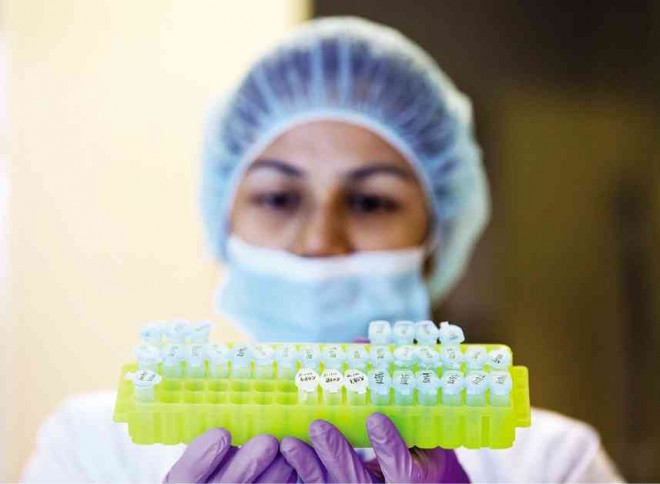Kentex factory fire: DNA tests to take 2 months

A technician of the Philippine National Police Crime Laboratory shows tissue samples taken from the relatives of those killed in the Kentex factory fire for DNA testing. LYN RILLON
It may take two months before the Philippine National Police Crime Laboratory finishes identifying those killed in the fire that hit a slipper factory in Valenzuela City last Wednesday.
“Today, we are starting the extraction of DNA from tissues which may last two months,” Senior Supt. Emmanuel Aranas of the PNP Crime Laboratory said on Monday.
Of the 72 workers of Kentex Manufacturing Corp. who died in the seven-hour fire, three have already been identified as their remains were largely intact.
The bodies of the 69 others, however, were burnt beyond recognition. Of this number, 28 were male, 36 were female while the gender of the remaining five have yet to be determined.
Valenzuela officials said the fire that razed the factory was caused by welding works carried out near flammable chemicals. The blaze trapped scores of workers on the second floor as steel bars over windows prevented their escape.
Article continues after this advertisementLess than 48 hours after the fire, authorities decided to have the remains temporarily interred at the Arkong Bato Cemetery in Valenzuela City pending the victims’ identification and in the interest of public sanitation.
Article continues after this advertisementOver the weekend, the PNP Crime Laboratory gathered tissue samples from 87 of the victims’ relatives by conducting a buccal swab—rubbing the inside of a person’s cheek with a cotton swab.

A child touches the picture of his mother, one of the factory workers killed in the May 13 Kentex fire in Valenzuela City, during a special Mass held for the victims over the weekend. Of the 72 victims, 69 have yet to be identified as their bodies were burned beyond recognition. AFP
Their DNA will then be compared to those of the victims until the police get a positive identification.
The samples were taken from the blood relatives of those killed in the fire such as their siblings or offspring.
This was the only option left to the PNP as the bodies of the 69 victims were too charred to be able to get fingerprints.
The process of identifying a body through DNA testing costs around P20,000 but the PNP will shoulder all the expenses.
Aranas, meanwhile, assured the victims’ relatives that the process would be as accurate as identifying the bodies through fingerprints.
The stages of forensic DNA profiling are specimen screening and sampling, DNA extraction from the tissue, DNA amplification, DNA electrophoresis or analysis, and data review and encoding.
Aranas appealed to the victims’ families for patience as they await the results of the DNA tests. “We understand their agitation, we will talk with them again to explain the process,” he said.